Should There Be a Tax on Meat? New Study Shows Many Americans Support the Idea
For years, PETA has called for an excise tax on meat to help cover the health and environmental costs that result from using animals for food. A consumer research study from March 2022 shows that more than a third of Americans—including a whopping 62% of Gen Z participants—would support an extra 10% meat tax to reduce consumption.
Cigarettes, alcohol, and gasoline are already federally taxed—through excise, or “sin,” taxes—to help pay for their hidden health or environmental costs. But although meat consumption is a health hazard and meat production is a leading source of environmental degradation, the meat industry has gotten off easy.
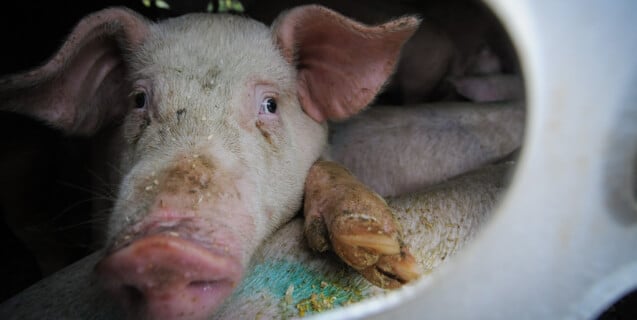
PETA is calling on lawmakers to support a sin tax on meat. Why? A tax on chicken, turkey, pig, cow, fish, and other animal flesh sold in grocery stores and restaurants could help reduce Americans’ skyrocketing annual health-care costs by encouraging people to eat less meat.
According to the Academy of Nutrition and Dietetics, vegans are less prone to develop heart disease, diabetes, and cancer than meat-eaters are and they’re also less likely to be obese. In addition, the production of meat is a leading cause of climate change, a looming environmental disaster that threatens the U.S. with billions of dollars in damages from rising sea levels, worsening storms, and increased droughts. By discouraging meat consumption, this tax could help slow climate change and related natural disasters. Revenue from the tax could be used to clean up areas polluted by animal agriculture, assist farms in transitioning away from animal-based agriculture, and increase access to healthy plant-derived foods in communities that need it most.
Learn more about taxing meat. Read our FAQs.
Why Tax Meat?
Tax Meat for the Health of Americans
The U.S. spends more on health care than any other nation and is one of the largest consumers of meat. Consider the following:
- The World Health Organization classifies processed meat as a Group 1 carcinogen, in the same category as cigarettes and asbestos.
- A 2016 University of Oxford study estimated that vegan eating could save $40 billion in environmental damages and $250 billion in health-care expenses associated with treating diet-related chronic diseases by 2050 in the U.S. alone.
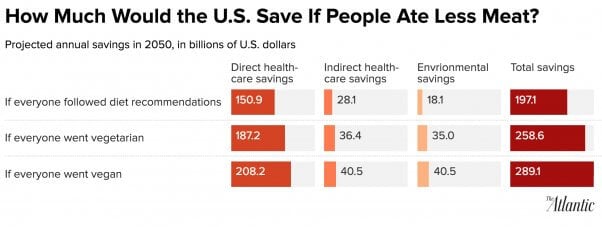
It doesn’t make sense that the millions of meat-free Americans have to help pick up the tab (through taxes and health-insurance premiums) when meat-eaters get sick. A tax on meat would make the system more equitable—just as “sin” taxes for alcohol and cigarettes already do.
Tax Meat for the Environment
Scientists and world leaders increasingly agree that climate change is the biggest challenge that humanity faces, and the meat industry is one of the world’s leading causes of it. Consider the following:
- A study by the University of Chicago found that going vegan is 50 percent more effective in fighting climate change than switching from a standard car to a hybrid.
- Animal agriculture is a leading source of carbon-dioxide, nitrous-oxide, and methane emissions, the top three greenhouse gasses.
- A study published in the journal Nature found that the production of beef and lamb emits 280 more greenhouse gasses per calorie than the production of legumes does. Chicken, which is considered a less environmentally destructive meat, still generates 65 times more emissions per calorie than legumes do.
- The United Nations (U.N.) has determined that raising animals for food causes enormous local and global environmental problems and that it should be a main focus in every discussion of land degradation, climate change, water and air pollution, water shortages, and the loss of biodiversity. The U.N. stressed that a global shift toward vegan eating is vital if we are to combat the worst effects of climate change.

Unless humans dramatically reduce their consumption of animal-derived foods, we won’t be able to make a meaningful dent in the climate crisis. A tax on meat could quickly and dramatically decrease U.S. meat consumption and help save our planet—and potentially, ourselves.
Tax Meat for Animals
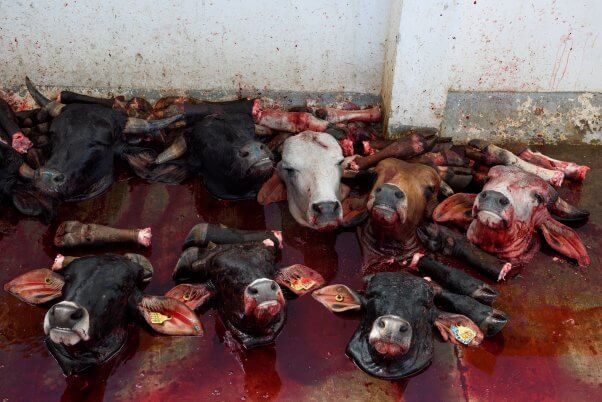
On today’s massive factory farms, animals are abused in horrible ways, including the following:
- Cows, pigs, chickens, and turkeys are routinely mutilated without any painkillers and confined to filthy cages, sheds, or feedlots for their entire lives.
- Fish are crowded into massive, filthy pens in which parasites run rampant.
- In the poorly regulated slaughterhouses of the U.S., the throats of billions of animals are routinely cut while they’re still conscious and millions of animals are scalded to death in tanks of hot water every year.
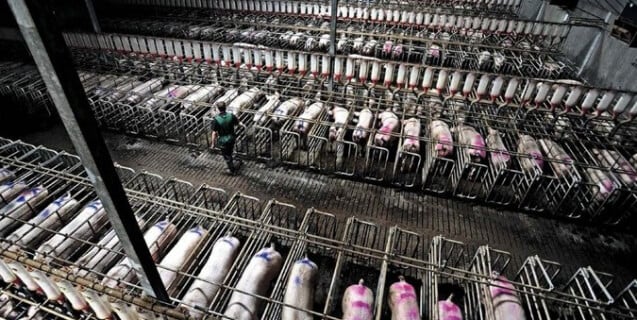
The Livestock Levy, a white paper published by the investment group Farm Animal Investment Risk & Return, reports that “over 180 countries now impose a tax on tobacco, 60 jurisdictions tax carbon and at least 25 tax sugar” and that meat taxes have been considered in Denmark, Germany, and Sweden. It’s time for the U.S. to get on board. When it comes to Americans’ meat habit, animals are paying the biggest costs. A tax on meat could help persuade humans to save other animals (and their own bodies) from abuse.
You Can Help!
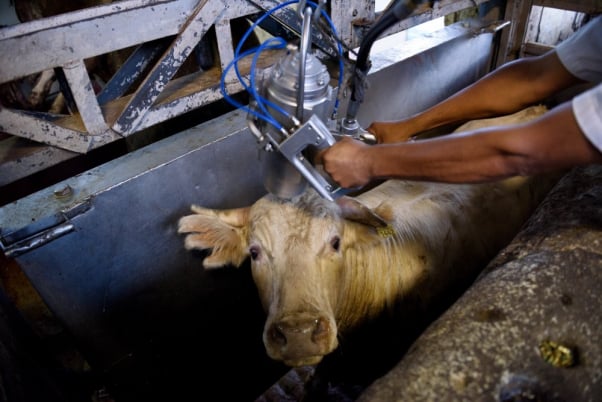
Support the tax on meat. Your local representatives need to hear from citizens like you about this important issue. Contact them today, and ask them to support this tax.




